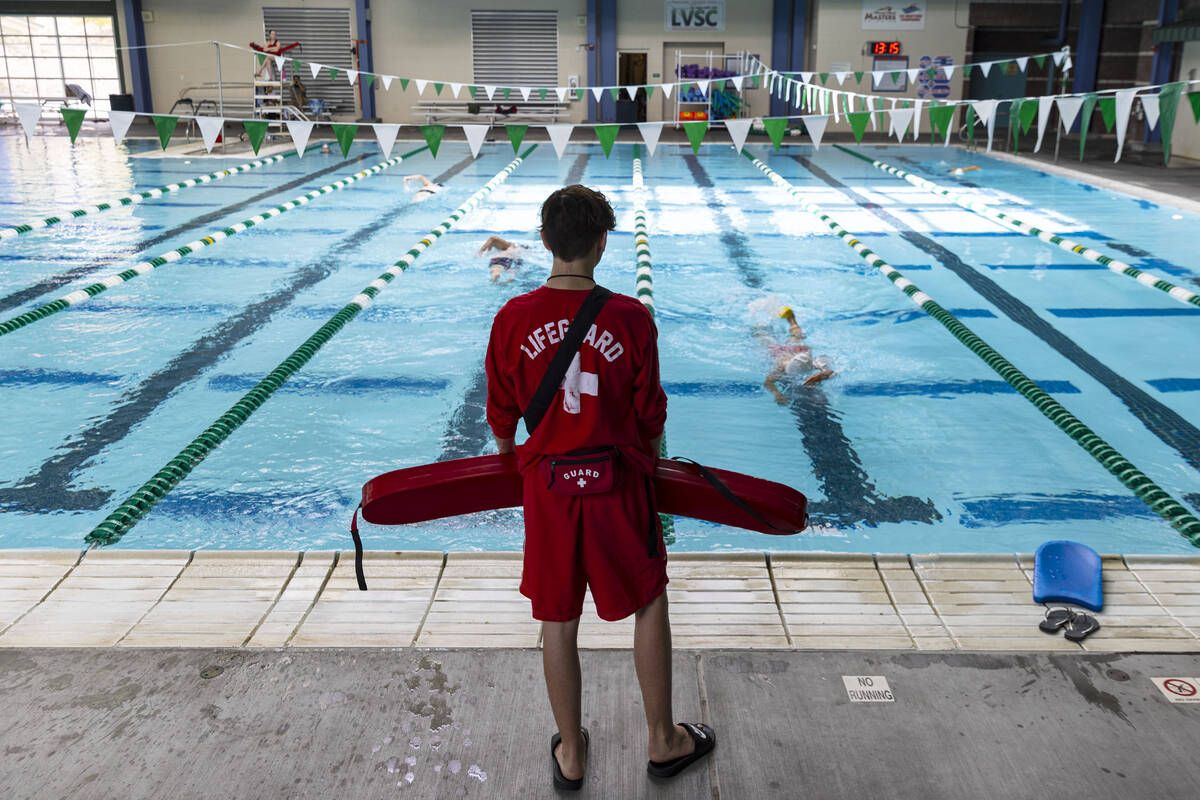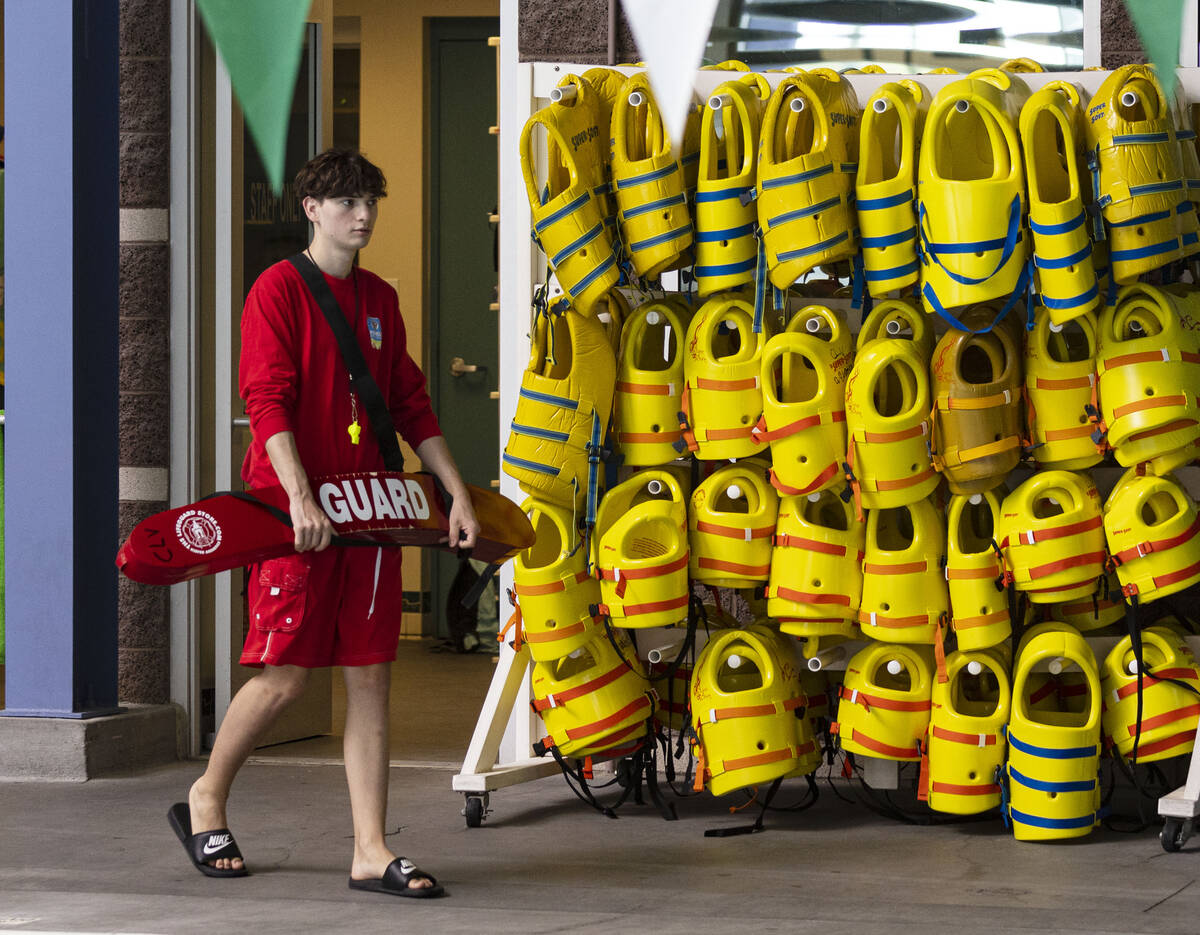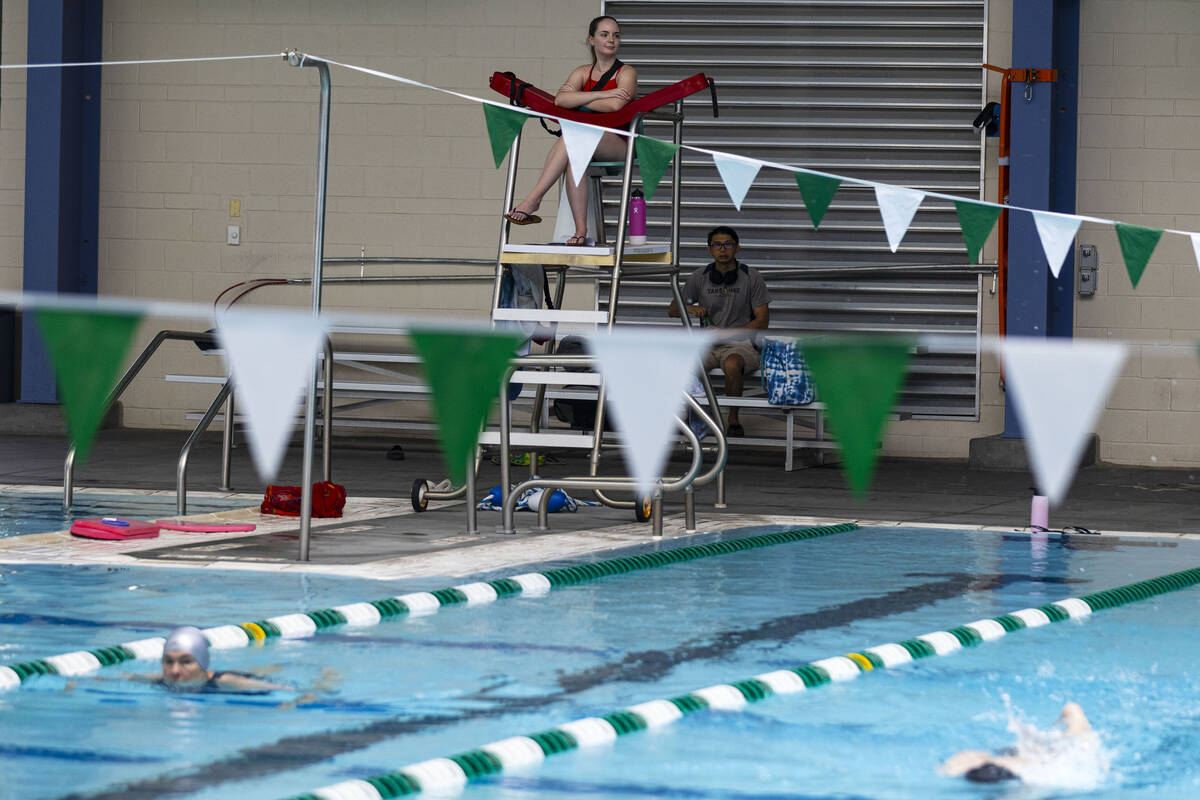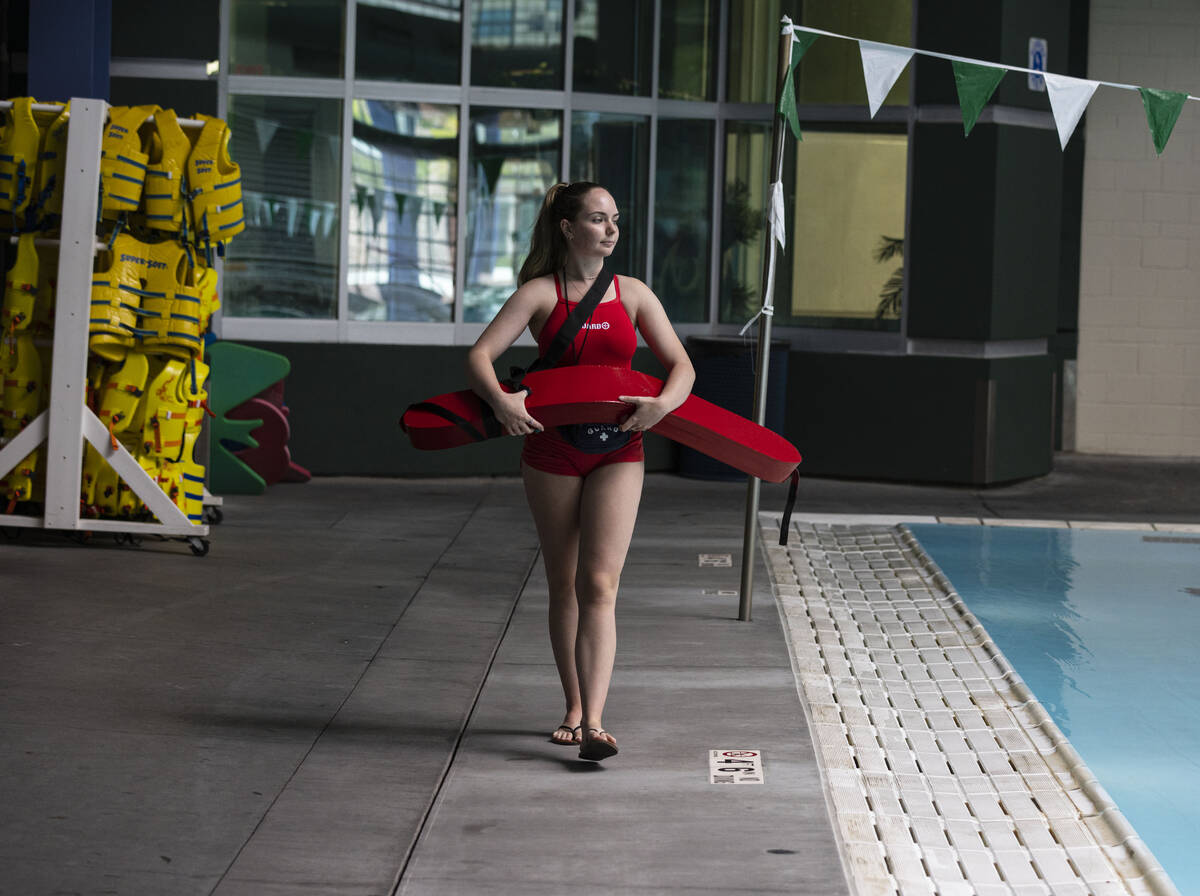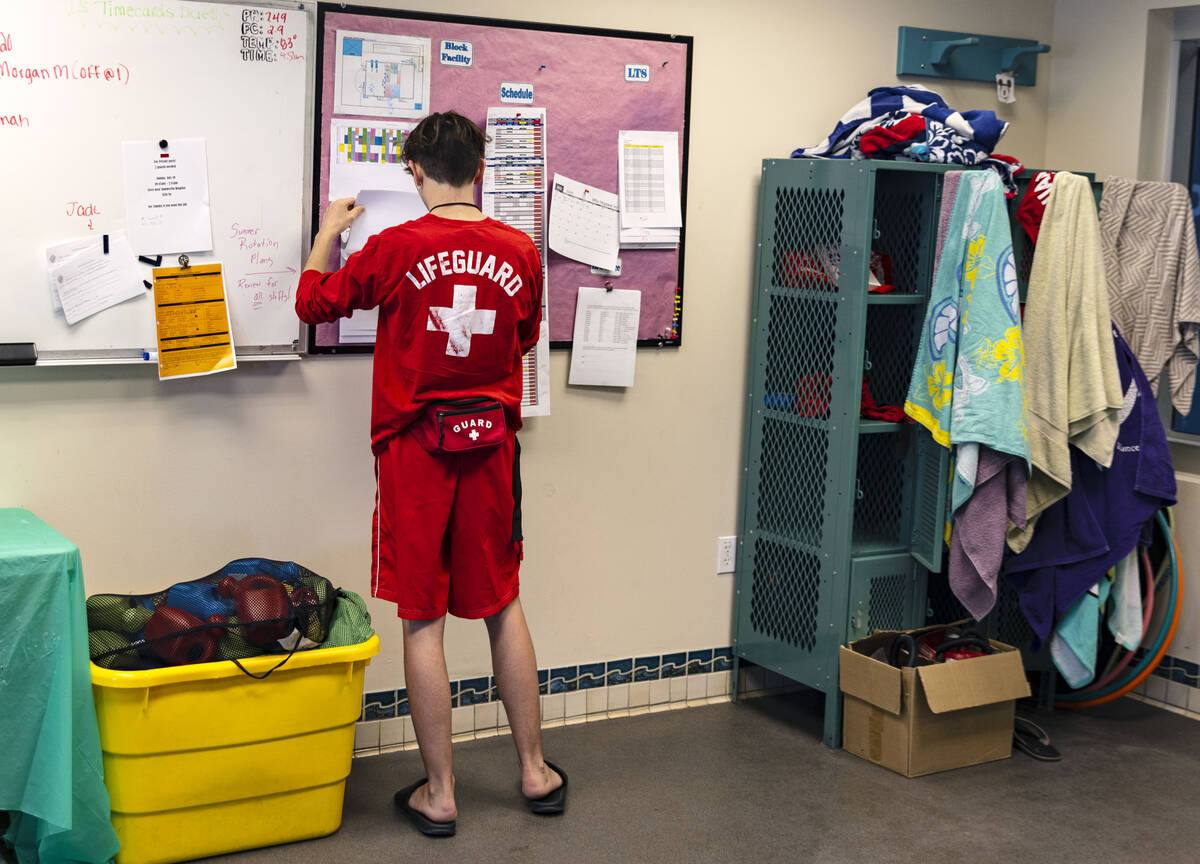Lifeguard shortage forcing some Las Vegas Valley pools to cut hours
Some public pools across the valley are shortening hours and implementing daylong closures as the region — and country — grapple with a shortage of lifeguards just as the summer swimming season begins.
Pool managers have turned to increased incentives to attract and retain the staff who oversee pool safety, give swimming lessons and run cash registers, according to officials from North Las Vegas, Las Vegas and Clark County.
“This is the worst we’ve seen,” Rachel Harmon, an aquatics specialist for the city of Las Vegas, said. “This year, we’re unable to open all six of our facilities to be fully operational. We had to cut hours at certain pools, some pools are closed on Sunday, some aren’t offering night swim. Even during COVID, we were able to be fully operational.”
City of Las Vegas pools are short about 40 to 50 staff members, including lifeguards, instructors, cashiers and maintenance workers, officials say. The city has resorted to paying for part of the certification process for lifeguards, increasing wages for cashiers — $12 per hour compared with $10 per hour last summer — and offering a retention bonus of up to $500 based on how many hours an employee works through the season.
Clark County pools are in a similar position. Katie Boehme, who oversees the Hollywood Aquatic Center on the valley’s east side, said the county can only operate one pool at a time at current staffing levels. She’s trying to hire 50 people. The county has turned to paying for new hires to receive their certification, which typically costs about $120, and keeping a lifeguard’s base pay at $13 hourly, on par with the city’s rate.
Boehme said staff attrition is common for these positions as they’re typically held by high school and college students. Last year had staffing issues as well, partially because of the limited number of people the Hollywood Aquatic Center could train at a given time with reduced-capacity health measures, she said.
“Normally, we lose a certain amount of staff every year,” Boehme said. “They go to college; they move on. But when COVID happened, it seemed like we had a significant number not returned, which was different than every year. … Because of those two scenarios combined, we’re still playing catch up.”
Retention bonuses and increased pay have worked well for the four pools in North Las Vegas, Director of Parks and Recreation Cass Palmer said. His staff and the city’s human resources team began looking last fall for different ways to attract and retain pool staff. They settled on $14 hourly for lifeguards and $15 hourly for water-safety instructors. The city is also offering a retention bonus of up to $500 if the employee stays for the entire season, defined as Memorial Day to Labor Day.
“The creativity of the wage rate and everything else has really helped us buoy, and we have staffing now to open all the pools,” Palmer said, though the department still wants to hire 30 more lifeguards for more flexible scheduling. “We’re looking for 16- to 20-year olds or plus individuals to come join us, and they’re very cost-conscious and price sensitive when it comes to gas increases,” he said. “Plus, it’s an employee’s market.”
Those measures are not unique. Lifeguard services and public pools across the country are dealing with the same labor shortage that many attribute to various forces from the COVID-19 pandemic. In Austin, Texas, the city’s parks and recreation department has offered lifeguards a $1,250 retention bonus, the Wall Street Journal reported.
Still, the shortage isn’t at all pools. At Cowabunga Vegas water parks, which runs two facilities in Summerlin and Henderson, regional general manager Cade Vereen said a fast-tracked hiring process and certification reimbursement helped them reach full staffing — with an asterisk.
“We’ll never stop accepting applications and taking interviews in part because of attrition,” Vereen said. “There’s natural attrition in the industry with school, camps and things like that.”
The water parks pay less than other resorts and public pool counterparts at $10 per hour, though it will jump to $10.75 when minimum wage in the state increases in July. But the water parks offer benefits such as free admission, friends and family tickets, half-priced concessions, kickball leagues, movie nights and other such events for staff to keep their status as one of the state’s largest employers of youth.
“It’s a unique, summer camp-like experience,” Vereen said. “There’s a lot of fun, there’s a lot of sun. There’s a lot of training and some tough guest interactions, but overall, having a top-notch work experience is key to keeping our workforce.”
Tait Ecklund, the owner of lifeguard service Desert Lifeguard Management, said his agency had to get creative to hire the 175 lifeguards who manage pools at casinos, country clubs and homeowners associations.
He offers a similar benefit package: free lifeguard certification, a retention bonus based on hours worked and an increased base wage. And he mentions one more solution: recruit retired people as lifeguards.
“Senior citizens can get back into the workforce and have an easy job,” Ecklund said. “It’s super chill, and seniors are very reliable, so I’ve been seeing a push to recruit seniors. You don’t have to be a 16-year-old to be a lifeguard. Anybody can do it.”
McKenna Ross is a corps member with Report for America, a national service program that places journalists into local newsrooms. Contact her at mross@reviewjournal.com. Follow @mckenna_ross_ on Twitter.



